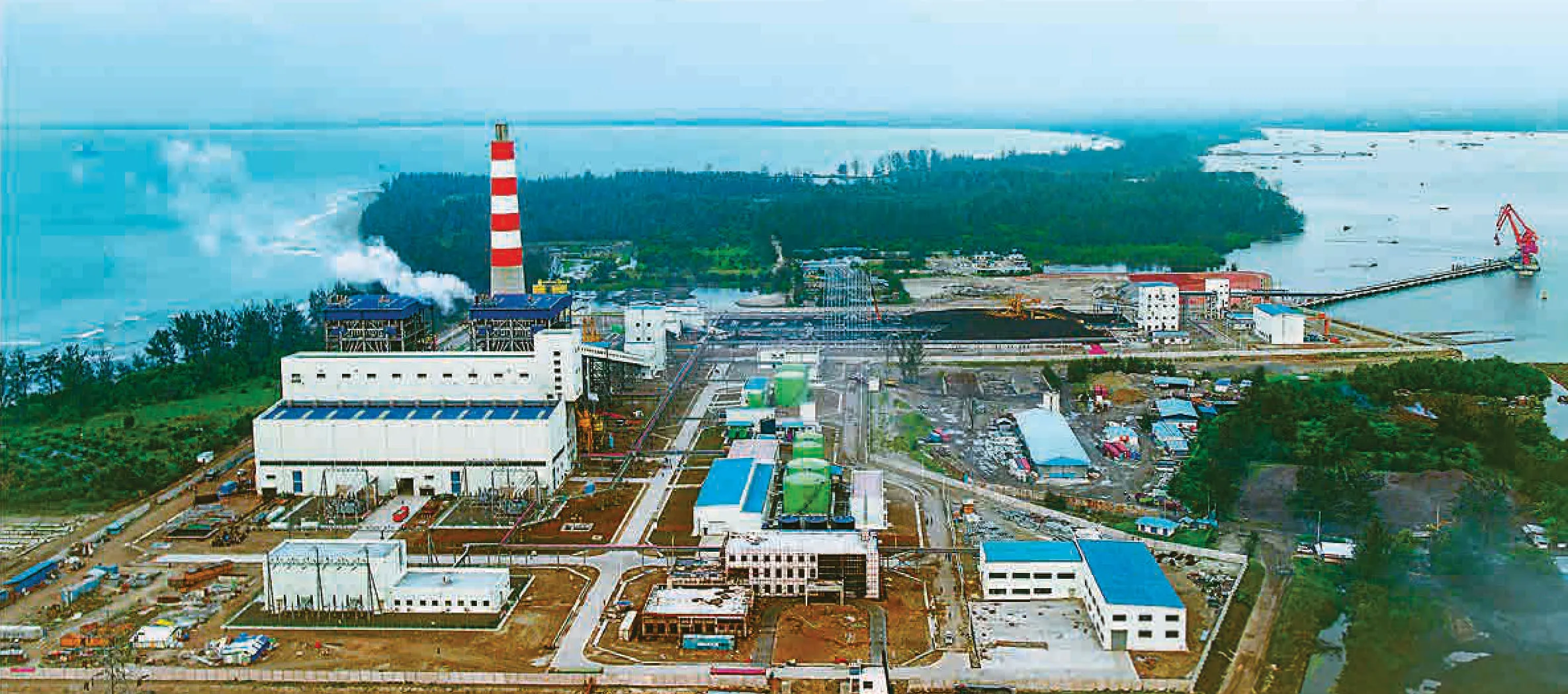EMPOWERING REMOTE INDONESIA Chinese-funded power plant helping boost development in isolated regions of Indonesia
By

On November 15,a celebration for grid connection of the Bengkulu Coal-fired Power Plant Unit 1 was held.Half a month earlier on the morning of October 30,Indonesian state-owned power utility Perusahaan Listrik Negara (PLN) was invited to the project site for electricity meters check,zeroing and lead sealing,and a pre-grid connection test witness statement was issued by the PLN certification body Pusat Sertifikasi.The test officially began at 2:00 p.m.After a series of major tests such as rotating steam turbines at 3,000 revolutions per minute,a noload test and raising main transformer voltage from zero,the test results were approved by the PLN,and the first unit of the plant finally achieved gridconnected power generation at 1:53 a.m.on October 31.
Located in Bengkulu,a remote province on the western coast of Sumatra in Indonesia,the plant is the first of its kind and largest foreignfunded project in the region.PLN solicited proposals for the project in 2014,and it was contracted to energy giant Power Construction Corporation of China (POWERCHINA) in a buildoperate-transfer (BOT) model.The plant has installed capacity of 2x100 megawatts.Following the success of the first unit,the second is expected to begin operation soon before the final commercial operation date (COD) of February 25,2020.
Acute Power Shortage
Indonesia has long been suffering an acute lack of electricity that has hindered its economic development.Over 5 million residents don’t have reliable access to power.By the end of 2017,the country had a combined installed power generation capacity of 60,790 megawatts with a national household electrification rate of 95.4 percent and an average annual increase in power demand of 13 percent.
In recent years,the isolated outer islands have emerged as priorities on the development agenda of the Indonesian government.Outside densely populated areas such as Java and Bali,the peripheral islands of Indonesia have been struggling to secure a stable electricity supply,especially remote spots scattered in the eastern reaches of the archipelago.Power outages frequently occur in these areas when a power generator or grid fails or maintenance is required.Government-funded power projects are often planned but suspended due to tight budgets.Currently,the Indonesian government is working on encouraging private and foreign investment in power plant development.
According to Agus Joko Saptono,Sumatra Director of the Indonesia Investment Coordinating Board,the Bengkulu coal-fired power plant,a major demonstration project,will have long-term effects for the region and attract more investors to the province.All stakeholders are working together to keep the project on schedule,he added.
A long-awaited boon for the local community,the new power plant will guarantee a consistent household electricity supply in western Sumatra.The improved power supply will also enable investors to start businesses in the area and create jobs to contribute to economic growth and local people’s overall well-being.
The Bengkulu plant is part of Indonesian President Joko Widodo’s ambitious plan to add another 35,000 megawatts of power capacity.The goal is to increase the country’s total installed capacity to 106,000 megawatts by the end of 2027 with an average annual growth of 6.86 percent.Electricity generated by coalfired power plants will account for 37 percent of the newly added capacity in the next decade.
A Model Project
A trendsetter in global clean energy and power infrastructure development,POWERCHINA has strived to make the Bengkulu project a benchmark for power plant construction in Indonesia from the start.All subsidiaries participating in construction such as Shanghai Power Supervision and Consultancy and Central China Electric Power Engineering have made every endeavor to ensure the project is completed in less than three years by practicing effective management across five aspects—overall progress,quality control,production safety,cost control and environmental protection.

Indonesia has long been suffering an acute lack of electricity that has hindered its economic development.Over 5 million residents don’t have reliable access to power.By the end of 2017,the country had a combined installed power generation capacity of 60,790 megawatts with a national household electrification rate of 95.4 percent and an average annual increase in power demand of 13 percent.

The Bengkulu plant is part of Indonesian President Joko Widodo’s ambitious plan to add another 35,000 megawatts of power capacity.The goal is to increase the country’s total installed capacity to 106,000 megawatts by the end of 2027 with an average annual growth of 6.86 percent.Electricity generated by coal-fired power plants will account for 37 percent of the newly added capacity in the next decade.
Petrus Halim,board chairman of Intraco Penta,a local heavy equipment manufacturer and distributor and shareholder of the project,expressed hope that all parties involved in the project would join forces to ensure commercial operation begins next year on schedule.
Capable of providing solutions for the entire chain of power infrastructure,the plant’s majority shareholder POWERCHINA has performed sound management integrating decision-making,design,supervision and construction.The plant adopted Chinese technical standards to ensure project quality.When fully functional,highefficiency units will help reduce coal consumption and control emissions of carbon dioxide and sulfur dioxide.An advanced wastewater treatment system will eliminate discharge of contaminated water.Other environmentally friendly technologies are being implemented to minimize possible damage to the local ecology.At the same time,POWERCHINA has sponsored numerous charitable activities in the local community such as building roads,making donations to schools and helping with disaster relief to fulfill its corporate social responsibility.
The project has already created 2,000 jobs for locals since construction work started,and over 100 more positions will emerge in its commercial operation phase.The procurement of construction machinery and materials has generated about US$40 million revenue for local businesses.A total of 14 local firms or joint ventures have participated in construction work,including backfilling,pile foundation construction,raising chimneys and dock building.With the localization of human resources constantly improving,POWERCHINA has helped train many local technicians through technical exchange and cooperation.Nearly a million tons of coal will be purchased locally every year to fuel the plant,benefiting the development of local industries.
Major progress on construction has proceeded on or ahead of schedule including construction of the first concrete foundation pile,first pouring of concrete in the main plant building,completion of main plant building foundation,installation of boiler steel structure,completion of chimney shaft construction and boiler hydrostatic test.The Bengkulu coal-fired power plant is fruit of synergy between China’s Belt and Road Initiative and Indonesia’s Global Maritime Nexus vision as well as a model project that demonstrates how China and countries along the route work together to build a community of shared future for mankind.
From the Kamchay Hydropower Station in Cambodia to the Nam Ou Cascade Hydropower Project in Laos,Port Qasim Coal-fired Power Plant in Pakistan,Barisal Coal-fired Power Plant in Bangladesh and the Wild Cattle Hill Wind Farm in Australia,Chinese energy enterprises have made steady progress in overseas project development and operation since the Belt and Road Initiative was proposed five years ago.
- China Report Asean的其它文章
- BINGE BUYING IN NUMBERS Online shopping-driven economics
- FLAGSHIP OF BRUNEI-CHINA COOPERATION A refinery and petrochemical plant begins commercial operation in Brunei
- GROWING MARKET FOR IMPORTS The considerable potential of the Chinese consumer market is alluring goods from around the globe
- DAWN OF AN ERA OF NEW CONSUMPTION
- SHARING REAL CHINA A journey of discovery by mainstream ASEAN media
- JEFFREY CHEAH:SUSTAINABLE DEVELOPER A Malaysian entrepreneur leads with concrete action

